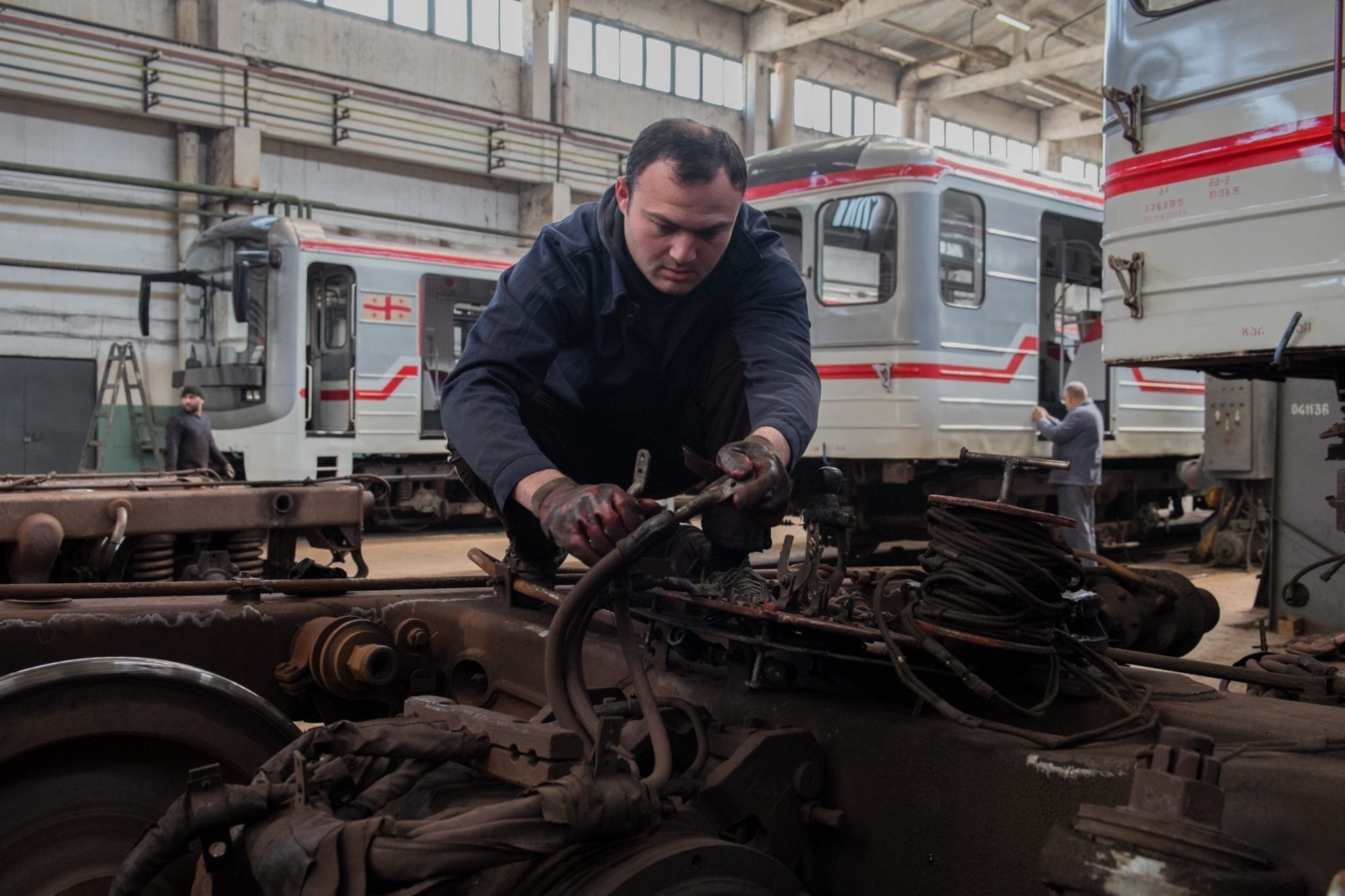
Jul 23, 2015
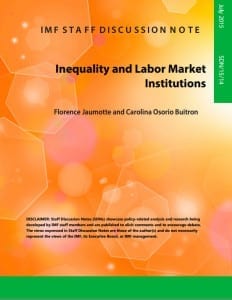 The notion that unionization and higher wages decrease income inequality is a fundamental premise of the Solidarity Center and our allies. But now a surprising source has reached the same conclusion: the International Monetary Fund (IMF).
The notion that unionization and higher wages decrease income inequality is a fundamental premise of the Solidarity Center and our allies. But now a surprising source has reached the same conclusion: the International Monetary Fund (IMF).
“The decline in unionization is related to the rise of top income shares and less redistribution, while the erosion of minimum wages is correlated with considerable increases in overall inequality,” the IMF concludes in a newly released “staff discussion note.”
According to Inequality and Labor Market Institutions, a steep decline in union density is followed by a 1.8 percent increase of top incomes and a 3 percent decline for workers’ share over the ensuing five years. Further, “if de-unionization weakens earnings for middle- and low-income workers, this necessarily increases the income share of corporate managers and shareholders.” The study examined 20 advanced economies between 1980 and 2010.
Declining union strength “appears to be associated with less income redistribution, likely through a reduced influence of unions on public policy,” says Florence Jaumotte, an economist and co-author of the publication. Not to mention another fact: unions help raise wages, both for members and the community at large.
Long a bastion of pro-employer policies, the IMF is not willing to go so far as to recommend the obvious. Acknowledging its findings can “suggest that higher unionization and minimum wages can help reduce inequality,” the IMF dodges the logical conclusion to pursue such policies, saying its data “do not constitute a blanket recommendation for more unionization or higher minimum wages.”
The IMF study notes that such decisions should be made on a country by country basis—leaving the reader to presume that countries supporting shared prosperity among all citizens will enable their workers to form unions, and ensure a living wage for all.
Apr 1, 2015
This report on global migration argues that the recognition and protection of the rights of migrant workers, their families and their communities must be the focal point of any application of the capabilities approach now accepted within the international development community.
This paper investigates the intersection of labor migration and the inclusive growth agenda, and seeks to recommend policy interventions so governments of origin countries can limit the threats labor migration poses to sustainable and rights-based development, and expand labor migration’s positive impacts by making migrant workers agents in promoting and realizing an inclusive growth agenda in their origin communities.
In this review of initiatives to regulate labor brokers, the authors find that state and civil society efforts to address migrant worker exploitation point to potential new policies, most effectively led by state-backed regulatory frameworks.
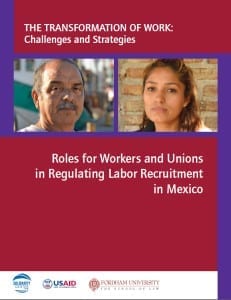
Fordham University law professor Jennifer Gordon examines the roles of guest workers as organizers, monitors and policy-setters in supply chain initiatives and other efforts to address labor recruitment violations.
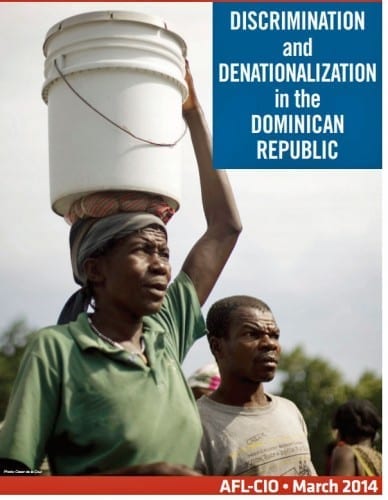
A September 2013 Dominican court ruling taking away citizenship from many migrants means they will be excluded from any activity that requires official identification, including working in the formal sector, attending school, opening a bank account, accessing health services, getting married, traveling or voting.
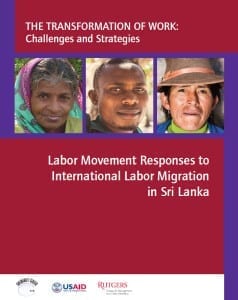
This report looks at the political and economic context within which Sri Lankan unions have attempted to respond to migrant workers, unions’ role in the key governance and policy mechanisms that pertain to labor migration, and the way the Sri Lankan labor movement responded to international migrant workers.
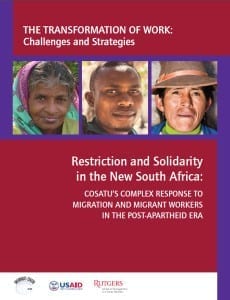
This report look at South African labor’s complicated engagement with migrant workers by examining the migration policy debate, labor’s response to the xenophobic attacks of 2008 and two organizing campaign in the agricultural sector. It sheds light on how labor migration and hostility toward immigrants are intertwined with the state’s embrace of neo-liberal economic policy and with growing labor precariousness.
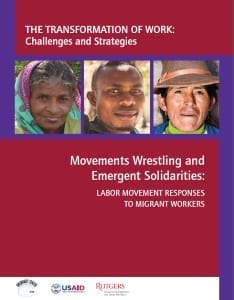
This report synthesizes a two-year project. Part one consisted of desk and case study research conducted by telephone in Jordan and the Dominican Republic looking into cases where unions had made significant changes in their approach to migrant worker organizing. Part two involved field studies in South Africa and Sri Lanka and provides analysis of strategies and results.
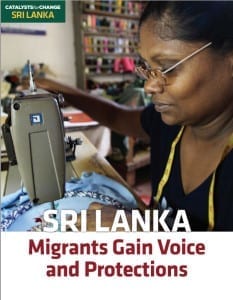 Sri Lanka: Migrants Gain Voice and Protections
Sri Lanka: Migrants Gain Voice and Protections
The Migrant Services Center, a Solidarity Center partner, is assisting migrant workers and their families in Sri Lanka while championing structural change through legislative and governmental processes, and offers a model for other labor and worker rights organizations.
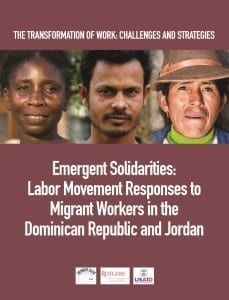
This report explores examples of unions making significant change in their approaches to migrant worker organizing and how the Solidarity Center has played a role in shifting union thinking about migrant workers and supporting union engagement and activities.
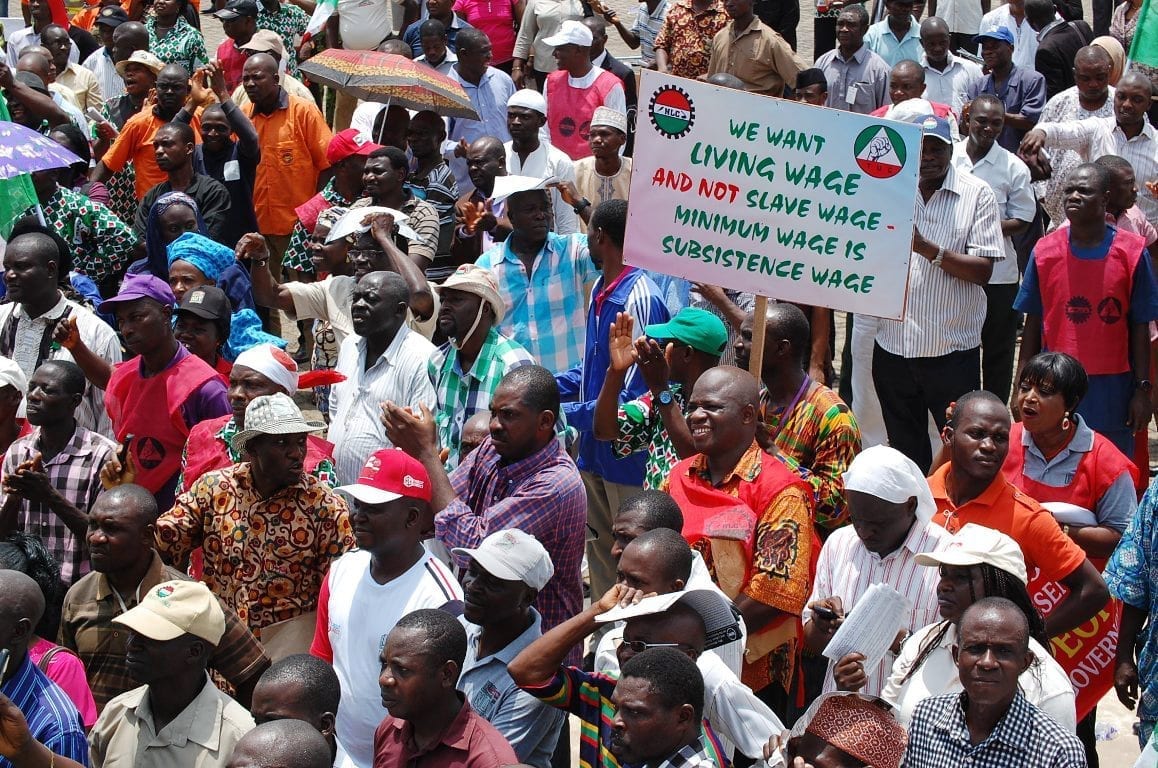
Dec 5, 2014
Inequality around the world has its roots in the labor market, according to this year’s International Labor Organization’s (ILO) “Global Wage Report.” ILO research shows that increased worker productivity–particularly in developed economies, where inequality saw its widest increase—has had little effect on boosting wages. However, some emerging and developing economies, especially those focused on poverty reduction, did see inequality decline through a greater focus on more equitable wage distribution and increased paid (as opposed to self-) employment.
The ILO found that minimum wages contribute effectively to reducing wage inequality—and collective bargaining is “a key instrument for addressing inequality in general and wage inequality in particular.”
Some of the blame for flat wage growth can be laid on the 2008 financial crash, which pushed workers out of jobs and lowered growth rates in many economies. The long-term forces of globalization, technology and the decline of unions also have contributed to the problem.
“Average monthly real wages grew globally by 2 percent in 2013, down from 2.2 percent in 2012,” according to the report. Developing and emerging economies drove this growth: Asia saw a 6 percent increase, Eastern Europe and Central Asia nearly 6 percent and the Middle East saw real wages rise by almost 4 percent. Wages in Latin America and the Caribbean rose by less than 1 percent. Average wages in developed countries grew just 0.4 percent since 2009, despite a 5.3 percent increase in worker productivity.
Inequality fell most in Argentina and Brazil. Workers’ real wages in industrialized countries like Japan, Spain and the United Kingdom are less than they were in 2007.
In almost all countries surveyed, wage gaps remain between women and men, between national and migrant workers and between workers in the formal and informal economy.
According to the ILO, the gender “wage penalty” occurs despite education, experience and productivity, and often as a result of discrimination. Indeed, women’s average wages are between 4 percent and 36 percent less than men’s, and the gap widens for higher-earning women. Closing that gap will require policies to combat discrimination and gender-based stereotypes, and improve maternal, paternal and parental leave, says the report.
The ILO was created in 1919, as part of the Treaty of Versailles that ended World War I, to reflect the belief that universal and lasting peace can be accomplished only if it is based on social justice.
Read a summary of the full Global Wage Report.
Check out the Global Wage Report in Short (video).
Oct 31, 2014
Workers across Asia are taking to the streets this fall with protests against proposed World Bank policies that fall short of ensuring fundamental worker rights, like freedom of association and collective bargaining.
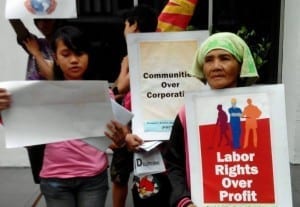
Worker right activists rallied outside World Bank meetings in the Philippines this fall. Credit: Alyansa Tigil Mina
In July, the World Bank released drafts of its revised Environmental and Social Safeguard Policies, a set of guidelines aimed to ensure that World Bank-funded projects do not harm communities or the environment.
The proposed safeguards for the first time would include a section on labor. But unlike international finance institutions such as the European Bank for Reconstruction and Development, the World Bank would not require borrowers to adhere to International Labor Organization (ILO) core labor standards. Further, labor protections would extend only to workers employed directly by borrowers and exclude all employees of contractors or sub-contractors, who generally account for the vast majority of workers on World Bank-funded projects.
“The current draft of the safeguards … leaves especially vulnerable workers open to exploitation and abuse,” AFL-CIO President Richard Trumka said, noting that contract workers already disproportionately suffer from discrimination and unsafe working conditions.
Other proposed safeguards also fall short. As the AFL-CIO notes, “there is no enforceable provision to protect human rights, troubling exceptions to protections for indigenous rights and no clear process or procedure for individuals and communities seeking redress if things go wrong.”
Although the World Bank is consulting with governments, corporations and some non-governmental organizations, activists say the most vulnerable people—such as informal economy workers and indigenous populations—have been left out of the discussions.
“Instead of creating safeguards that favor corporations, what we actually need are provisions that will empower and strengthen the bodies that make up the labor forces. We don’t see that in the draft that is being circulated right now,” said Edsil Bacalso, coordinator of NAGKAISA, a network of labor groups in the Philippines and a Solidarity Center ally.
During a World Bank meeting discussing the safeguards in Washington, D.C., this month, a coalition of activists advocating for workers, human rights and the environment presented a statement signed by more than 170 groups demanding the safeguards be strengthened. As Soumya Dutta from the Indian Peoples’ Science Campaign read the coalition statement, activists in the audience took off jackets to reveal t-shirts saying: “Safeguard people and the planet, not corporate profits and human rights abuses!”
Solidarity Center staff from Thailand, Indonesia and Washington, D.C., took part in a forum in September to help craft the statement’s section on labor. Worker rights activists say that if the World Bank adopts the safeguards as currently written, it would set off a cascading effect, spurring multilateral development banks to weaken their labor requirements for borrowers and harming workers.
Activists are holding rallies around the world, including in Bangladesh, India ad Japan, timed to coincide with World Bank meetings in each country on the proposed safeguards. The World Bank is seeking to present the final draft safeguards during its meeting next fall.
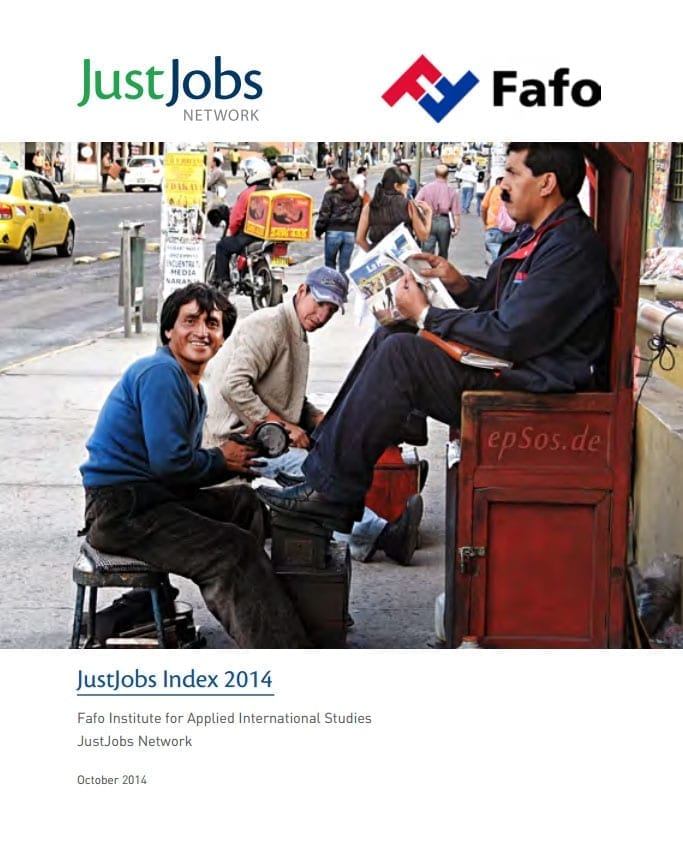
Oct 20, 2014
A new data-driven online index launched by JustJobs Network, a nonpartisan global policy and research institute, highlights the need for sustainable employment and offers policymakers and other decision-makers worldwide a tool to help generate more and better jobs worldwide.
Created in partnership with Fafo, an independent and multidisciplinary research foundation, the JustJobs Index offers the first-ever index to measure both quantity and quality of jobs. The site includes two indexes with country-by-country data trends between 2000 and 2013. The Global JustJobs Index ranks 148 countries on quantity and quality of employment in 10 areas, such as unemployment and gender equality. The Enhanced JustJobs Index includes 41 countries where more extensive data is available, and offers 17 indicators. The site also provides longitudinal country comparisons, maps and downloadable reports.
The JustJobs Index is anchored in the International Labor Organization (ILO) decent work agenda and Article 7 of the International Covenant on Economic, Social and Cultural Rights recognizing the right of everyone to just and favorable working conditions. An accompanying report details the methodology underlying the data.
More than 200 million workers around the world are jobless, nearly 40 percent of them young workers, and many more—approximately half the global workforce—labor in the informal sector, where they lack basic protections. And even formal sector workers increasingly find their wages stagnant and their benefits stripped away.
JustJobs says the index should “provide a strong empirical basis for policy dialogue and formulations” as more policymakers and leaders around the globe recognize that high inequality is a sign that a country’s labor market is not producing enough good jobs and that work “is fundamental to the well-being of economies.”
Aug 7, 2014
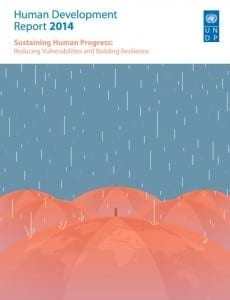 Full employment should be a policy goal for all countries, regardless of level of development, according to the latest United Nations Development Program (UNDP) report. The report emphasizes the importance of meaningful, decent work for developing a worker’s dignity and creating community cohesion.
Full employment should be a policy goal for all countries, regardless of level of development, according to the latest United Nations Development Program (UNDP) report. The report emphasizes the importance of meaningful, decent work for developing a worker’s dignity and creating community cohesion.
“Sustaining Human Progress: Reducing Vulnerabilities and Building Resilience” also emphasizes that young people are especially at risk for unstable work because of lack of job experience and financial instability. Even employed young people are vulnerable, experiencing lay-offs and pay cuts during economic downturns. Despite the challenges, the report says, the growing youth population can potentially bring more educated and more productive workers into the economy.
According to the report, South Asia and sub-Saharan Africa have the highest rates of vulnerable employment—some 77 percent of the total workforce in 2011. The same regions have the highest rate of working poor. As far back as 1993, UNDP identified jobless growth, where output increases, but employment lags behind. In addition, even as productivity increased, workers’ wages remained fairly stagnant.
The report highlights South Africa among three countries experiencing improvements in equality of marginalized groups. Because apartheid left the workforce divided by race, leaving only unskilled jobs for minorities, the country introduced an Employment Equity Act in 1998. This act encouraged women and members of minority groups to participate in the workforce, reducing unemployment and poverty. The act, in conjunction with other more specific efforts, has helped change the racial distribution of South Africa’s workforce and included historically disadvantaged groups.
In a special contribution to the report, Juan Somavia, former director general of the International Labor Organization, says modern economic thinkers see work as “only” a production cost.
“Nowhere in sight is the societal significance of work as a foundation of personal dignity, as a source of stability and development of families or as a contribution to communities at peace,” he writes. Somavia then outlines his policy recommendations: living wages, respect for worker rights, gender equality, workers organization and collective bargaining and pensions, among others.
Stable, decent employment not only provides workers and their families with financial security but can also boost a sense of dignity and status within the community. Higher rates of female employment can also widely benefit communities, in part by changing the perception of the “value” of girls, increasing female education and reducing poverty.
Read the full report.

 The notion that unionization and higher wages decrease income inequality is a fundamental premise of the Solidarity Center and our allies. But now a surprising source has reached the same conclusion: the International Monetary Fund (IMF).
The notion that unionization and higher wages decrease income inequality is a fundamental premise of the Solidarity Center and our allies. But now a surprising source has reached the same conclusion: the International Monetary Fund (IMF).
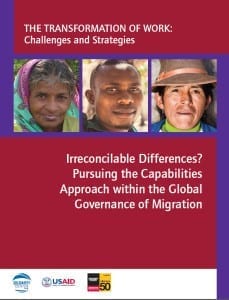
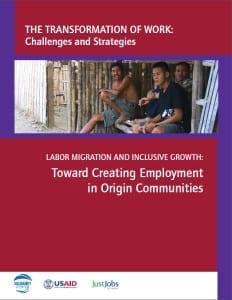
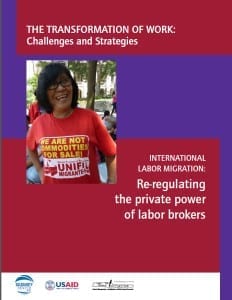 International Labor Migration: Re-regulating the Private Power of Labor Brokers
International Labor Migration: Re-regulating the Private Power of Labor Brokers









